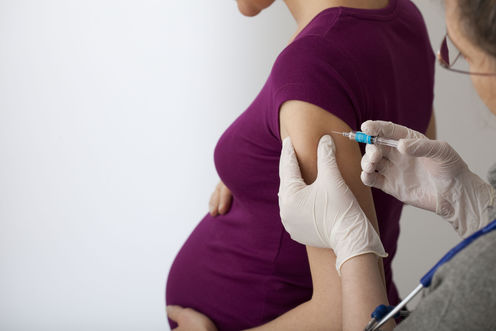
Pregnancy can be a confusing time, raising a number of questions for women. Which prenatal vitamins do I take? Which foods do I need to avoid? Can I take something for a headache or have my morning coffee? Add to this vaccinations. While some should be avoided, that shouldn’t deter a mother from getting the ones she really needs to protect her and her baby.
Pregnant women have a uniquely altered immune system, which is naturally adapted to allow the “foreign” foetus to grow safely. However, these complex immune changes mean pregnant women are at increased risk of complications from certain infectious diseases. Similarly, newborns are particularly vulnerable to certain infections and don’t respond well to vaccines until they are at least a few months old.
Fortunately, pregnancy offers another mechanism to protect newborns. The placenta has the amazing ability to transfer the mother’s antibodies to the foetus, particularly from the 28th week of pregnancy onwards. By full term, antibody concentrations in the newborn usually exceed the mothers’ by 20%–30%, providing short-term “passive” immunity to offset a baby’s limited early immune responses.
The flu and whooping cough
These are two illnesses all mothers should be vaccinated against while pregnant. Influenza, or the flu, is a viral infection characterised by fever, cough, and body aches and is potentially serious during pregnancy.
Pregnant women are up to five times more likely to be hospitalised during the flu season compared to when not pregnant. Having the flu in pregnancy also increases the chances of stillbirth and preterm delivery.
After influenza, the second most common vaccine-preventable disease in Australia is pertussis, better known as “whooping cough”. Pertussis is initially hard to differentiate from other respiratory infections until severe coughing spasms and breathing difficulty begin.
The disease appears no more severe in pregnancy than in non-pregnant adults; however, it is extremely serious in young babies, particularly those under three months of age who have the highest risk of dying from complications.
Vaccines to avoid during pregnancy
Vaccines which contain live viruses, such as the measles, mumps and rubella vaccine, are not recommended during pregnancy due to the possible risk of transmission of the vaccine virus to the unborn baby. This risk is theoretical; follow-up of accidental administration of live vaccines during pregnancy has found no adverse effects.
It’s important that women who are planning pregnancy have their immunity to these diseases checked prior to conceiving. Women who are not protected against measles, mumps, rubella (German measles) or varicella (chickenpox) should be vaccinated at least one month prior to becoming pregnant. If missed before pregnancy, live vaccines against these diseases can also be given after birth and are safe while breastfeeding.
Preventing disease
Using certain vaccines during pregnancy to reduce the risk of serious disease in mothers and newborns is not new. In settings where many unhygienic births occur, the World Health Organization’s Maternal and Neonatal Tetanus Elimination Initiative has significantly relied on tetanus immunisation of pregnant women in order to achieve a 94% reduction in deaths from tetanus in newborns, from 787,000 in 1988 to 49,000 in 2013.
Influenza vaccination during pregnancy can prevent around 63% of influenza infections and 91% of hospital admissions in infants under six months and has also been shown to reduce influenza infections in pregnant women.
Recent research shows pertussis vaccine given during pregnancy prevents 90–93% of cases of pertussis in infants.
Multiple studies corroborate these findings, including recent research from Western Australia, showing fewer hospitalisations in pregnant women and their infants. Importantly, immunisation during pregnancy offers superior protection to young infants compared to other preventive strategies.
The demonstrated benefits coupled with good evidence on the safety of both vaccines in pregnancy underpin Australian and World Health Organisation recommendations for antenatal immunisation.
Influenza and pertussis vaccines are now freely available to pregnant women in Australia, and both vaccines are recommended in every pregnancy: this is because maternal antibody levels decline sharply in the first year after vaccination.
How many women get vaccinated and how can we improve?
Despite the benefits of influenza and pertussis vaccination during pregnancy, many pregnant women miss out on being protected. Until recently, only one-third of Australian women received an influenza vaccine during pregnancy.
Early data from Western Australia show influenza vaccine uptake has improved to 55% and pertussis vaccine uptake is 58%, with a similar increase in uptake seen in other states.
There are ways we could further increase the number of vaccinated pregnant women. Women trust their healthcare provider to give them advice during pregnancy. Despite guidelines and free vaccine, 40% of women are not advised by their health provider to get vaccinated.
Considering three-quarters of unvaccinated women say they would have been vaccinated had their provider recommended it to them, it is critical healthcare providers discuss these vaccines with their pregnant patients.
Women should check with their GP whether they are up to date with routinely recommended immunisations prior to planning pregnancy. In addition to routine vaccines for women before pregnancy and their babies’ vaccinations after birth, immunisation during pregnancy offers the best means of protecting young babies from two very serious infections.
Kristine Macartney receives funding from the NSW and Australian Governments Department of Health and the National Health and Medical Research Council
Annette Regan does not work for, consult, own shares in or receive funding from any company or organization that would benefit from this article, and has disclosed no relevant affiliations beyond the academic appointment above.
